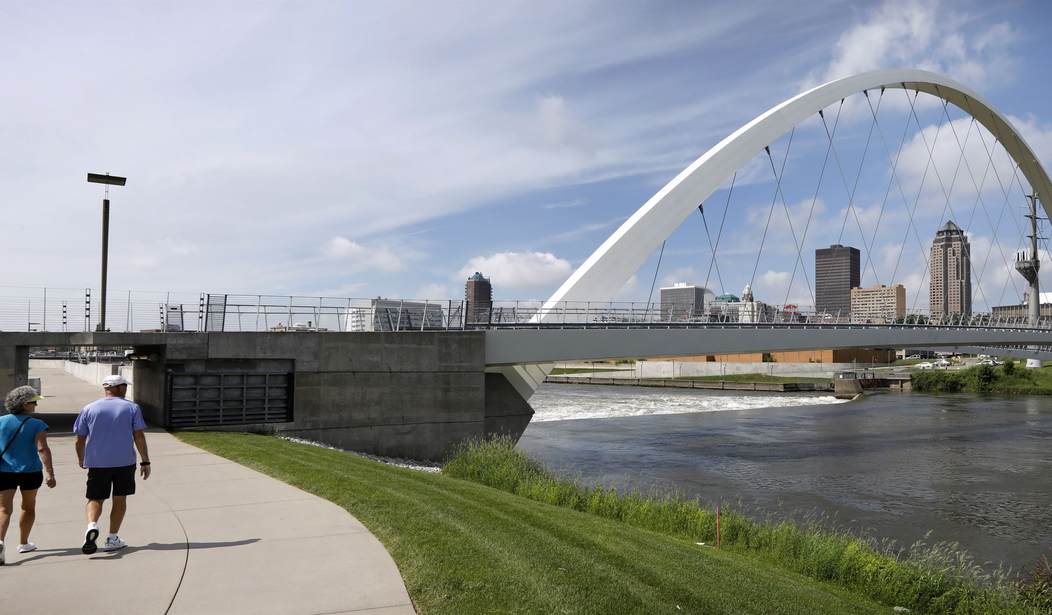Iowa is in the spotlight again as America’s first presidential caucus on January 3 nears. Coincidentally, my day job found me traveling across various portions of President Herbert Hoover’s home state on a bi-weekly basis the past four months, and I was able to gather views from a diverse group of people while making these treks.

In January 2008, Mike Huckabee won the state’s Republican caucus, and Barack Obama took the Democratic caucus. Ten months later in the general election, the former Illinois senator prevailed by ten points over John McCain. Though that was the same margin as traditionally liberal Minnesota, the Hawkeye State has a more regional voting bloc. The rural west toward the Missouri River is more conservative, while the larger cities and Mississippi River towns to the east lean Democrat.
 Dubuque Town Clock
Dubuque Town Clock
Amanda Lawson is a 23-year-old copywriter/media specialist in scenic Dubuque (home to a strong economy), which sits along the border with Illinois and Wisconsin in a county Obama won by 17 points in the general election. But Amanda, a Wisconsin native who graduated from Drake University in Des Moines, actually moved right in college, tiring of liberal bias. She’s now a registered Iowa Republican who supported McCain last time around and prefers Newt Gingrich on January 3:
Many of Gingrich’s ideas align with mine in relevance of importance. His recognition of President Reagan as someone who told the truth and went above and beyond to do what’s right, rather than what’s easiest, builds my confidence in him as a strong leader for our country.
Lawson can also see how “a more conservative view” might have greater success among Republicans in 2012:
Rick Perry’s very open views on the importance of religion in our country’s survival may draw individuals ready to see an extreme change from what the Obama administration provided.
 Freedom Rock in Western Iowa
Freedom Rock in Western Iowa
Tony Nelson is also 23, and hails from a large Christian family in Council Bluffs, a western Iowa town bordering the Missouri River and Nebraska. This is Pottawattamie County, a growing area closing in on being the sixth Iowa county with more than 100,000 residents. McCain prevailed here by two points over Obama.
Nelson, a loss mitigation specialist, has a business degree from Bob Jones University in South Carolina, where he received a Baptist education. He likes Ron Paul, but will support Gingrich next month. Begrudgingly, he believes Mitt Romney has the best shot to unseat Obama:
Though Ron Paul’s foreign policy views trouble me, he’s the only one with the guts to get the country out of debt, even if by drastic measures. But Paul lacks support, so by default I hope Romney is the choice. Newt has too much baggage.

State Capitol Building, Des Moines
Tom Lindaman is a 42-year-old mortgage specialist in Des Moines, which sits in Polk County, Iowa’s largest. Expectedly, Obama triumphed here in 2008 by 14 points. Lindaman is politically active, having spoken at his local caucus last primary season. He doesn’t like “moderates” such as Romney, Huntsman, or Gingrich, echoing some voices from a recent Ron Radosh PJM piece:
A moderate Republican puts the party in the same position as under George W. Bush and John McCain. Although this would please the centrists, fewer conservatives want to settle for the lesser of two evils. They want a leader, not a plate of Jello.
Lindaman supported Herman Cain before the businessman dropped out December 3. Additionally, he believes Michele Bachmann would have “no trouble beating Obama if she were given a fair chance by the RNC.” Lindaman also prefers Rick Santorum over the aforementioned “moderate” Republicans.
Mitt Romney said during the December 10 debate that he sees tons of Ron Paul signs around the state, which I can confirm from my travels. As recently as December 13, polls had Rep. Paul possibly winning Iowa, though in 2004 we saw how greatly polls fluctuate in caucuses. And though New York Times columnist Ross Douthat recently reported more statistics to support the claim of Paul rising, from my discussions and historical review, the Texas congressman’s followers are the proverbial “vocal minority” we often see with unorthodox presidential candidates like Strom Thurmond or Henry Wallace in 1948. Lindaman concurs:
Paul’s supporters are very loud, but not nearly as widespread as they’d have us believe. This was evident in 2008 when he got a lot of attention, but wound up in single digits and way out of the top tier. His organizers had a real problem getting people out to support him when it counted, and I don’t see that being any different this year. Like “Occupy,” the buzz is bigger than the actual numbers.
 Burlington
Burlington
Bruce Atterbury is a retired commercial truck driver from Burlington, a blue-collar town of 25,000 along the Mississippi in the southeastern part of the state. He, like many Midwesterners, has socially conservative views, but doesn’t necessarily trust the GOP fiscally. A registered independent, Atterbury is in his 60s with two children and three grandchildren. Des Moines County, which houses Burlington, has seen a steady decrease in population due to the economic downturn. It now has just over 40,000 residents. Obama won by 23 points there due to support from independents, but as we’ve seen across America, this tide seems to be changing:
I’ve been following it closely, and the Republicans I’d support over Obama are Huntsman, Santorum, Bachmann, and maybe Perry. … Romney’s a phony, but I feel I can trust some of the others, though not Ron Paul. Newt’s really smart, but I wouldn’t vote for him.

Trevor LeCroix is a 33-year-old civil engineer in Pella, a charming town of 10,000 between Des Moines and Burlington. LeCroix was raised in Davenport, a city ten times that size along the Mississippi in the Quad Cities region; his parents were union railroaders who voted Democrat despite being devout Catholics. LeCroix, who runs his own construction company and has three young children, has voted Republican in every election since his first opportunity in 1996. He’s simple: anyone but Obama:
I loved Cain, and it was a tragedy what they did to him. Now Perry and Bachmann are my people, but I just want Obama out.
Though he’s not enamored with the former Massachusetts governor, LeCroix firmly believes Romney is the most electable:
Yeah, I can see him winning easily. Polls show that he’s besting Obama in the swing states. Whatever it takes, man. I’m tired of the president’s class warfare.
Three other heavily populated areas are worth following in January, as well as next November.
Linn County is home of Iowa’s second largest city, Cedar Rapids, with over 200,000 residents. Obama won there by more than 20 points in 2008.
Blackhawk County is home to Waterloo and Cedar Falls. The county has over 100,000 people, and the latter city contains the University of Northern Iowa, with nearly 15,000 (92 percent in-state) students. Obama bested McCain in this area by 22 points last election.
Woodbury County, in the northwestern part of the state where the highly watched December 15 debate occurred, has over 100,000 residents. But unlike other counties we’ve explored, it borders deep red Nebraska and South Dakota, and thus leaned McCain’s way. Sioux City, population 85,000, is the county seat.
Johnson County, in the east-central part of the state, is heavily populated, but not a factor in January nor November, as it is home to the University of Iowa. Once called the “Berkeley of the Midwest,” Iowa City is as left-wing as they come. The area saw one of Obama’s largest wins anywhere in 2008, as he received over 70% of the vote.
Iowa polls and trends have been as fluid as any in recent memory. Whatever happens that Tuesday in the heartland will likely have been unpredictable.









Join the conversation as a VIP Member